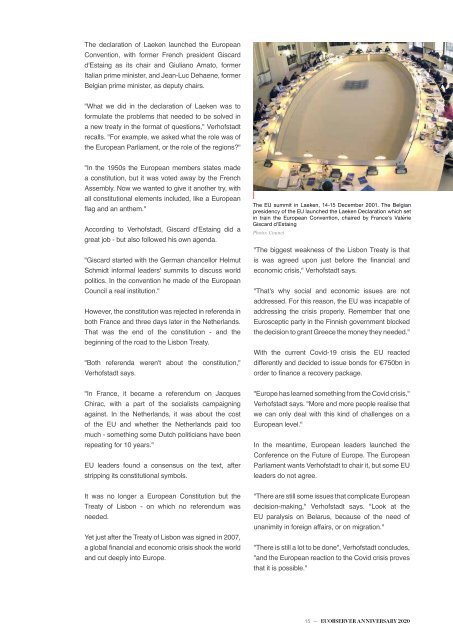20 years of European journalism & history
Twenty years doesn't seem a lot. Certainly not in the light of European history. But while we were writing this magazine for the 20th anniversary of EUobserver, we were surprised just how much happened in the European Union in those two decades.
Twenty years doesn't seem a lot. Certainly not in the light of European history.
But while we were writing this magazine for the 20th anniversary of EUobserver, we were surprised just how much happened in the European Union in those two decades.
Create successful ePaper yourself
Turn your PDF publications into a flip-book with our unique Google optimized e-Paper software.
The declaration <strong>of</strong> Laeken launched the <strong>European</strong><br />
Convention, with former French president Giscard<br />
d'Estaing as its chair and Giuliano Amato, former<br />
Italian prime minister, and Jean-Luc Dehaene, former<br />
Belgian prime minister, as deputy chairs.<br />
"What we did in the declaration <strong>of</strong> Laeken was to<br />
formulate the problems that needed to be solved in<br />
a new treaty in the format <strong>of</strong> questions," Verh<strong>of</strong>stadt<br />
recalls. "For example, we asked what the role was <strong>of</strong><br />
the <strong>European</strong> Parliament, or the role <strong>of</strong> the regions?"<br />
"In the 1950s the <strong>European</strong> members states made<br />
a constitution, but it was voted away by the French<br />
Assembly. Now we wanted to give it another try, with<br />
all constitutional elements included, like a <strong>European</strong><br />
flag and an anthem."<br />
According to Verh<strong>of</strong>stadt, Giscard d'Estaing did a<br />
great job - but also followed his own agenda.<br />
"Giscard started with the German chancellor Helmut<br />
Schmidt informal leaders' summits to discuss world<br />
politics. In the convention he made <strong>of</strong> the <strong>European</strong><br />
Council a real institution."<br />
However, the constitution was rejected in referenda in<br />
both France and three days later in the Netherlands.<br />
That was the end <strong>of</strong> the constitution - and the<br />
beginning <strong>of</strong> the road to the Lisbon Treaty.<br />
"Both referenda weren't about the constitution,"<br />
Verh<strong>of</strong>stadt says.<br />
The EU summit in Laeken, 14-15 December <strong>20</strong>01. The Belgian<br />
presidency <strong>of</strong> the EU launched the Laeken Declaration which set<br />
in train the <strong>European</strong> Convention, chaired by France's Valérie<br />
Giscard d'Estaing<br />
Photo: Counci<br />
"The biggest weakness <strong>of</strong> the Lisbon Treaty is that<br />
is was agreed upon just before the financial and<br />
economic crisis," Verh<strong>of</strong>stadt says.<br />
"That's why social and economic issues are not<br />
addressed. For this reason, the EU was incapable <strong>of</strong><br />
addressing the crisis properly. Remember that one<br />
Eurosceptic party in the Finnish government blocked<br />
the decision to grant Greece the money they needed."<br />
With the current Covid-19 crisis the EU reacted<br />
differently and decided to issue bonds for €750bn in<br />
order to finance a recovery package.<br />
"In France, it became a referendum on Jacques<br />
Chirac, with a part <strong>of</strong> the socialists campaigning<br />
against. In the Netherlands, it was about the cost<br />
<strong>of</strong> the EU and whether the Netherlands paid too<br />
much - something some Dutch politicians have been<br />
repeating for 10 <strong>years</strong>."<br />
EU leaders found a consensus on the text, after<br />
stripping its constitutional symbols.<br />
"Europe has learned something from the Covid crisis,"<br />
Verh<strong>of</strong>stadt says. "More and more people realise that<br />
we can only deal with this kind <strong>of</strong> challenges on a<br />
<strong>European</strong> level."<br />
In the meantime, <strong>European</strong> leaders launched the<br />
Conference on the Future <strong>of</strong> Europe. The <strong>European</strong><br />
Parliament wants Verh<strong>of</strong>stadt to chair it, but some EU<br />
leaders do not agree.<br />
It was no longer a <strong>European</strong> Constitution but the<br />
Treaty <strong>of</strong> Lisbon - on which no referendum was<br />
needed.<br />
Yet just after the Treaty <strong>of</strong> Lisbon was signed in <strong>20</strong>07,<br />
a global financial and economic crisis shook the world<br />
and cut deeply into Europe.<br />
"There are still some issues that complicate <strong>European</strong><br />
decision-making," Verh<strong>of</strong>stadt says. "Look at the<br />
EU paralysis on Belarus, because <strong>of</strong> the need <strong>of</strong><br />
unanimity in foreign affairs, or on migration."<br />
"There is still a lot to be done", Verh<strong>of</strong>stadt concludes,<br />
"and the <strong>European</strong> reaction to the Covid crisis proves<br />
that it is possible."<br />
15 — EUOBSERVER ANNIVERSARY <strong>20</strong><strong>20</strong>

















